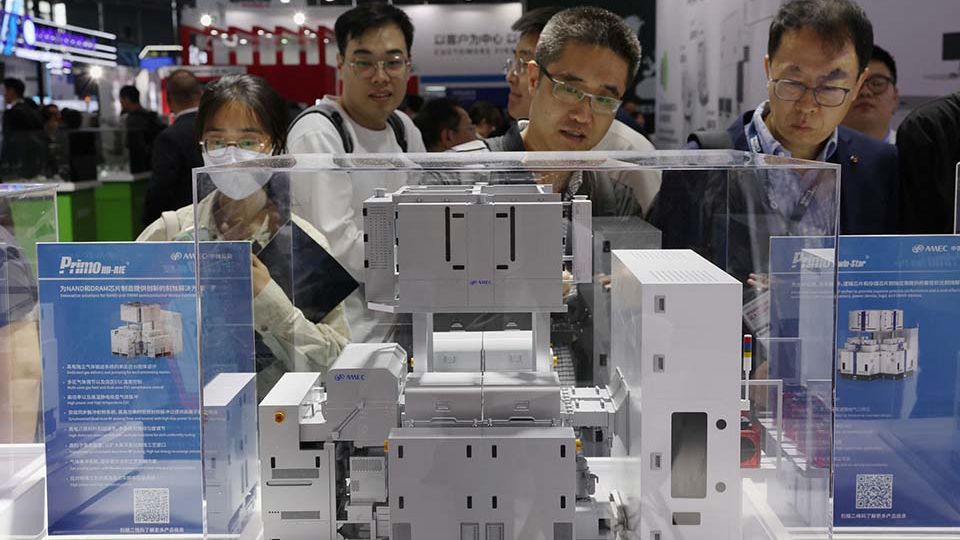May 23, 2025
KUALA LUMPUR – Malaysia has abruptly distanced itself from an earlier announcement of a China-backed artificial intelligence (AI) project, amid heightened scrutiny over geopolitical sensitivities and ongoing trade talks with the United States.
The reversal exposes Malaysia’s precarious balancing act as it navigates fierce US-China rivalry over semiconductors – a sector accounting for 40 per cent of its exports.
Prime Minister Anwar Ibrahim called the announcement on the AI project by a junior minister on May 19 “premature”, and insisted that Malaysia remains “fiercely independent” in choosing technologies.
“To clarify, (the project is) still in the midst of this negotiation. Because it is the private sector, I don’t think it’s for the government to announce, but as a policy we made it very clear. We are fiercely independent. We want what is best for our country,” he told a media briefing on May 21.
He added: “For a country like Malaysia, I’m not taking into account the skirmishes and the tensions between countries, particularly China or the EU or the US. We choose what is best for our country.”
Deputy Communications Minister Teo Nie Ching announced on May 19 that Malaysia would develop a first-of-its-kind AI system powered by Huawei Technologies chips, with plans to deploy 3,000 Huawei Ascend chips as the backbone of a national AI initiative by 2026.
Only a day later, her office was quoted by Bloomberg as saying it had retracted her remarks that were made at the launch of the “Strategic Artificial Intelligence Infrastructure”, without explanation. A Huawei representative was reported to have said that the company has not sold Ascend chips in Malaysia and that the government has not bought any.
The Ministry of Investment, Trade and Industry (Miti) on May 21 also issued a statement repudiating Ms Teo’s remarks, saying the project was private-sector driven and not officially endorsed by the government.
The about-turn comes as Washington pressures Kuala Lumpur to crack down on suspected smuggling of Nvidia chips to China, amid ongoing US-Malaysia trade talks, and with Beijing courting South-east Asia for AI tie-ups.
Malaysia’s cautious response appears to reflect its ongoing efforts to maintain strategic balance amid the intensifying US-China tech rivalry.
“Miti would also like to reiterate that Malaysia remains committed to full compliance with all applicable export control laws, national security directives and emerging guidance from global regulatory authorities, especially those that uphold the highest standards of transparency, accountability, neutrality and security, premised upon the principles of multilateralism with the World Trade Organisation at its core,” the ministry said in the May 21 statement.
The proposed project – which includes deploying an AI language model by Chinese start-up DeepSeek – drew the attention of the White House, which has been monitoring developments closely to counter Beijing’s growing influence in global AI markets.
“As I’ve been warning, the full Chinese stack is here,” US President Donald Trump’s top AI adviser David Sacks posted on X on May 20. The Trump administration rescinded Biden-era global semiconductor curbs, which restricted chip sales to Malaysia, “just in time”, he wrote.
The following day, Mr Sacks’ post on X said: “Update: The Malaysian government has walked back the announcement. This is after the Deputy Minister of Communications stated, in prepared remarks, that Huawei Ascend chips would ‘form the backbone’ of the country’s national AI effort.”
Malaysia remains in discussions with the US on trade matters, including potential tariff adjustments, underscoring its sensitivity to geopolitical implications.
While the South-east Asian country is unenviably caught between two rival superpowers, Datuk Seri Anwar sought to downplay the tug-of-war situation.
“This so-called tech rivalry between the United States and China sometimes has been overly exaggerated,” he told reporters at the briefing.
Malaysia should clearly demonstrate that it complies with US trade requirements, said Malaysia Semiconductor Industry Association president Wong Siew Hai.
“It is to our benefit to make sure that we are a country that can be trusted to do business with,” Datuk Seri Wong told The Straits Times.
Dr Oh Ei Sun, a senior fellow at the Singapore Institute of International Affairs, said: “Neutrality is nowadays no longer a viable option as both sides are clearly trying to impose their mutually exclusive choices on other countries such as Malaysia.
“Malaysia would have to study the high-tech business and technological trends carefully and make its strategic choice accordingly, praying that at the end of the day, it would be the beneficial choice.”
US concern over AI chips being smuggled into China via other Asian transit points was sparked in January when Washington announced new curbs on their export and began probing whether countries like Singapore were being used as transit points to circumvent these restrictions.
The semiconductor industry is an important part of Malaysia’s economy, with electrical and electronic products making up 40 per cent of exports.
The US government earlier in 2025 pressured Malaysian authorities to crack down on the movement of prized Nvidia AI chips that enter the country, amid suspicions that many of these were ending up in China.
- Hazlin Hassan is Malaysia correspondent at The Straits Times.


